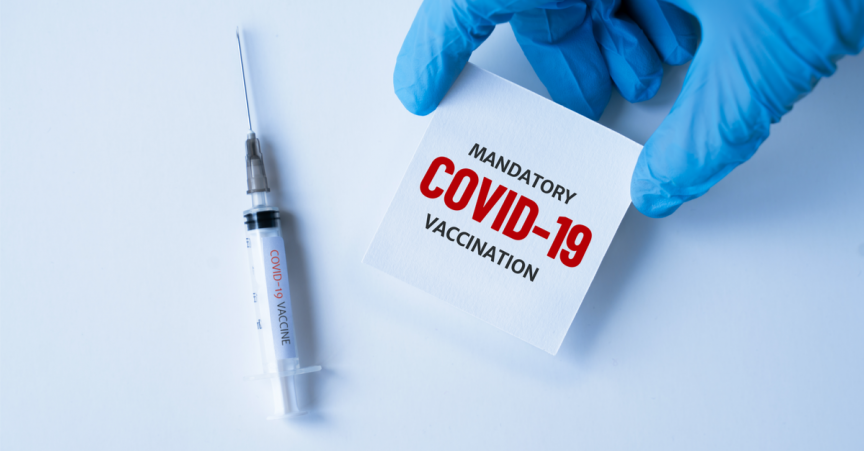Finally – the long-awaited fix for the devastating COVID-19 is here! Businesses large and small are breathing a collective sigh of relief with the hope that when all their employees are inoculated, everyone can get back to congregating and collaborating in person. You might be writing that company-wide memo even now, telling people how, when, and where to get the jab. But before you hit “send,” you might want to take time to consider the employee sentiment and individual circumstance so that your workplace reentry plan is embraced with enthusiasm rather than resistance!
Anti-vaxxers or thoughtful health care consumers?
The term ‘anti-vaxxer’ sits in a lengthy list of contemporary pejoratives that may or may not be valid. And in the case of COVID vaccines, for which the FDA granted emergency use approval (EUA), it would be remarkably insensitive to discount the publics’ concerns!
According to a November Pew Research Center poll, 39% of Americans said they would “probably” or “definitely” not get the vaccine, declining from September’s skeptical 49%. The primary concerns rested on the safety, effectiveness, and testing of the Pfizer and Moderna vaccines. Usually, it takes about ten years to develop a vaccine. Both Moderna and Pfizer’s drugs are based on mRNA, a technology that has never before been approved for therapeutic use by regulators. With no earlier mRNA vaccines and no long-term studies, it is natural for many to be worried about long-term safety and side effects, especially when more traditional formulas are waiting on the horizon. A boss who is empathetic and concerned about trust will take the time to understand the various COVID vaccine technologies and validate employee concerns.
Laying the groundwork
The first thing to do is educate yourself and your managers on vaccine options and technologies. A useful resource is “What’s The Difference Between Covid-19 Coronavirus Vaccines?” by J.V. Chamary in Forbes. This article offers a good overview of six major vaccines. Educating yourself will allow you to communicate confidently and knowledgeably about options.
When you have researched credible sources about the vaccine, do some internal surveying before making vaccination mandatory. You can conduct formal or informal polls, asking such questions as: “Would you feel more comfortable coming to work if everyone had a COVID vaccine?” “Would you be willing to receive a vaccine now, after one month, two, or within three months?” (2021 will see more traditional vaccine-type approvals increasing the comfort level for some people).
Next, develop some positive talking points based on your research. For example:
- U.S. taxpayers are paying for most vaccines; however, your company health care provider may charge a co-pay for administering the shot. Consider reimbursing related employee expenses.
- Though masks and distancing will still be needed, getting the shot will prevent sick time off and potential long-term illness for you and your family.
- These vaccines prevented COVID illness in most of the recipients. After two doses, the Moderna vaccine had an efficacy rate of 94.5%, while Pfizer’s was 90%. Check out the CDC’s webpage, Frequently Asked Questions About Covid Vaccine, for important information.
Realize that most people prefer a choice in their personal medical decisions and may become suspicious if pertinent facts are omitted from your talking points, so be transparent about the upside and the down. Remind employees that they should direct all medical concerns to their physician or your Employee Assistance Program if they have any questions.
To mandate or not to mandate?
While it seems most employers plan to make inoculation optional in the short term, some see a competitive incentive for compulsory vaccination as a condition of employment. If mandatory, business owners should account for exceptions like collective bargaining agreements, anti-discrimination protections for medical reasons under the Americans with Disabilities Act, or religious exemptions under the Title VII of the Civil Rights Act of 1964.
Before issuing a mandatory vaccine requirement, check with your local and state guidelines. It is also wise to consult your legal and insurance representatives to review your plan and ensure that it is lawful, equitable, and addresses risk. It should protect employee privacy under the HIPAA laws and provide for exempt workers’ privacy and dignity. You may need to make accommodations for distancing or remote work.
Finally, plan for employee time off. Reactogenic symptoms reported from the Moderna and Pfizer vaccines include fever, headache, muscle, and joint pain. Most symptoms lasted less than two to three days. In two instances, widely reported life-threatening anaphylaxis occurred after administering the Pfizer shot. Some authorities do not recommend the mRNA vaccines to pregnant women, kids under 16, and people with certain health conditions or severe allergies. There is a Federal monitoring system and vaccine compensation program for qualified vaccine injuries filed within one year. You should advise all employees to consult with their physician if they are concerned about receiving any vaccine or medication.
Happy, healthy employees are great for business!
As the business owner, it is critical to communicate that you care about your employees’ beliefs and well-being. Issuing a vaccine mandate is tricky, and you should be cautious, especially with so many employees already feeling stressed and fearful about their health. But the upside is a possible end to the pandemic. So whatever you choose, communicate, empathize, plan, and cultivate positivity. Don’t make decliners feel badly or ignorant. Understand that this is a real personal choice…for everyone involved.


